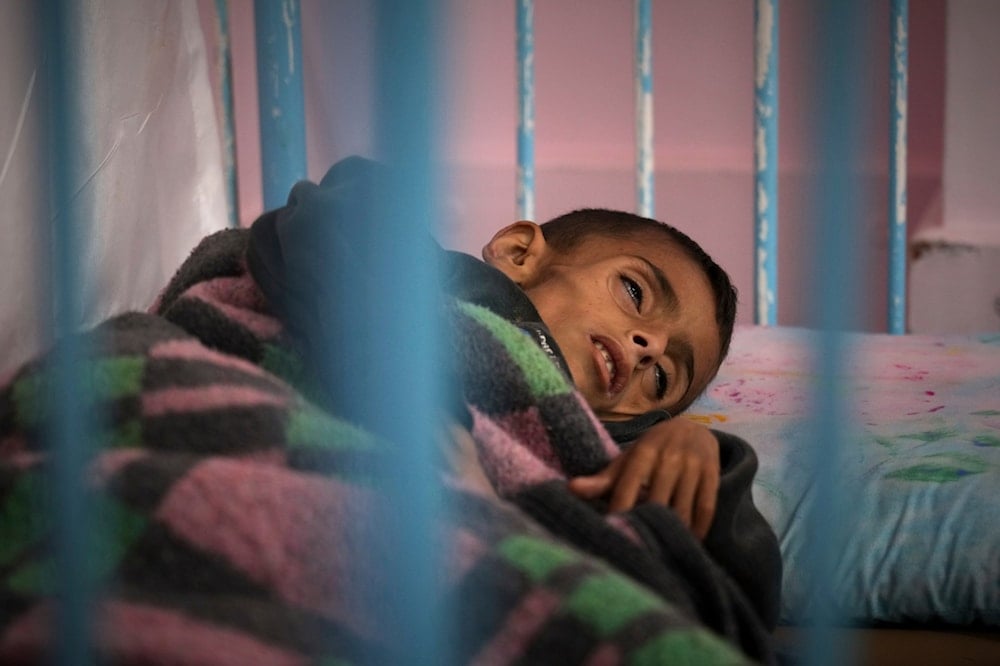UN rejects 'Israel’s' control-driven Gaza aid overhaul; famine deepens
The UN has rejected an Israeli proposal to overhaul aid operations in Gaza, warning it violates humanitarian principles.
-

Osama al-Raqab, 5, whose mother says his cystic fibrosis has worsened since the start of the war due to the lack of meat, fish, and enzyme tablets to help him digest food, is being treated at the malnutrition clinic in Nasser Hospital, Khan Younis, Gaza, on Thursday, May 1, 2025. (AP)
The United Nations Office for the Coordination of Humanitarian Affairs (OCHA) has rejected a recent proposal by the Israeli occupation to reshape the humanitarian aid distribution system in the Gaza Strip.
“We do not accept a proposal and a plan that does not live up to the core fundamental humanitarian principles of impartiality, neutrality, and independent delivery of aid,” said OCHA spokesperson Jens Laerke during a press briefing in Geneva on Tuesday.
Laerke criticized the Israeli plan as one “designed to further control and restrict supplies, which is the opposite of what is needed.”
Simultaneously, the UN Relief and Works Agency for Palestine Refugees (UNRWA) warned that hundreds of thousands of Palestinians in Gaza are surviving on just one meal every two to three days, due to the ongoing blockade enforced by the Israeli occupation.
“More than 66,000 children in Gaza are suffering from severe malnutrition,” UNRWA spokesperson Adnan Abu Hasna said.
Since March 2, the Israeli occupation has completely sealed off all crossings into Gaza, halting the entry of food, medical supplies, and other forms of humanitarian assistance. According to international organizations and human rights groups, this has worsened the already dire humanitarian crisis in the besieged enclave.
Gaza’s Government Media office reported that at least 57 Palestinians have died from starvation since October 2023. The World Bank noted that nearly the entire population of 2.4 million remains reliant on aid for survival.
“UNRWA will not be part of the new Israeli plan” for aid delivery, said Abu Hasna, stressing that it “doesn’t adhere to UN standards at all.”
Palestinian families risk their lives for basic necessities
Palestinians in Gaza continue to endure life-threatening conditions in their search for food. The daily ordeal faced by residents in northern Gaza, forced to navigate perilous terrain to obtain basic supplies, was recently documented by the Anadolu news agency.
With the Israeli occupation banning vehicle movement on key roads, such as Salah al-Din Street, residents now rely on carriages and tuk-tuks, often using the al-Rasheed coastal road, the only remaining route linking north to south Gaza.
Tuk-tuk driver Majeed Dabbour described the difficult journey to the Nuseirat refugee camp to collect flour. “It is a trip full of dust and danger,” he said. The lack of fuel, exposure to airstrikes, and absence of proper seating compound the challenge. “We are living under extreme pressure.”
He stressed the life-threatening nature of these trips, saying, “Any car moving on the road is targeted by the Israeli army; that is why we are forced to use primitive vehicles.”
“We have to take the risks to get the flour to feed our children, who have been facing starvation by the Israeli army for more than two months,” he added. Dabbour also warned that the flour available in the north is often spoiled and unsafe for consumption.
Al-Rasheed Street: Gaza’s lifeline turned death route
Another resident, Abdul Hamid, recounted the fear that accompanies each journey. “We say the shahadas before we move, as the Israeli gunboats are behind us in the sea, the tanks in front of us, and warplanes are overhead. We might be bombed any moment.”
He called the al-Rasheed route “the only dangerous road” left. “We seek help from God as we move,” he said.
Umm Eyad al-Lehaam, an elderly Palestinian woman, described her first journey along al-Rasheed Street to Khan Younis as “exhausting and hard for elderly people.”
Tuk-tuk driver Ahmed al-Banna added that the journey is taxing for all.
“We generally need to stop more than once for rest,” he told Anadolu.
“Some passengers don’t speak out of extreme fatigue or fear. But there is no other choice; they want to reach their destination at any cost.”
Gaza’s Government Media Office has recently declared that the territory has entered “an advanced stage of famine,” citing the continued closure of border crossings and renewed military aggression.

 4 Min Read
4 Min Read








